最新牛津译林版预备教材Lesson7语言点知识讲解
2021-2022学年牛津译林版英语七年级上册unit7 pretty词汇讲义
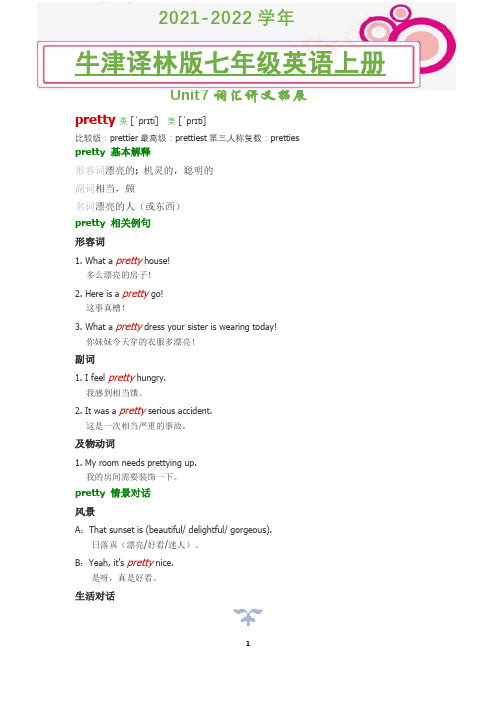
Unit7词汇讲义拓展pretty英[ˈprɪti]美[ˈprɪti]比较级:prettier最高级:prettiest第三人称复数:pretties pretty 基本解释形容词漂亮的; 机灵的,聪明的副词相当,颇名词漂亮的人(或东西)pretty 相关例句形容词1. What a pretty house!多么漂亮的房子!2. Here is a pretty go!这事真槽!3. What a pretty dress your sister is wearing today!你妹妹今天穿的衣服多漂亮!副词1. I feel pretty hungry.我感到相当饿。
2. It was a pretty serious accident.这是一次相当严重的事故。
及物动词1. My room needs prettying up.我的房间需要装饰一下。
pretty 情景对话风景A:That sunset is (beautiful/ delightful/ gorgeous).日落真(漂亮/好看/迷人)。
B:Y eah, it’s pretty nice.是呀,真是好看。
生活对话Unit7词汇讲义拓展A:you are like a bow and I, a violin. Together we can make music.“你是弓我是琴,共同谱出美好乐音。
”B:You're quoting from one of Herb's love letters?你在念赫伯情书里的东西啊?A:Oh, yes. Actually, an internet love postcard.对啊。
事实上,这是一张网络传情的明信片。
B:An Internet love postcard, that's pretty strange.网络传情的明信片,有点奇怪。
A:And this morning there were flowers from Herb at my doorstep!而且今天早上我的门前阶梯上有一束赫伯送的花!看病A:Good afternoon. What's the trouble?下午好。
Unit7知识点牛津译林版七年级英语下册

7B Unit71.ability n.能力①复数:②有能力做某事==③有不同的能力2.Believe it or not.3.Look out. ①当心;注意=②③向外看···④从···向外看4.短语:①种树②给某人让座给某人某物=③为某人收集某物为孩子们收集一些书收集n.④打伞干净公园(代词放中间)e.g.打扫干净它5.What can we do for the children in poor areas?我们能为贫困地区的孩子们做什么?①can =②辨析“can”和“be able to”③在贫困地区6.They need clothes and shoes most.他们最需要衣服和鞋子。
①need v.需要1)需要某物2)需要做某事②最需要···7.Some families are not even able to pay for pens and notebooks.一些家庭甚至没钱买笔和本子。
①able 能够1)反义词:2)能够做某事②pay v.为···付钱1)某人为···付钱2)复习“花费”(1)又花钱又花时间(2)只花时间(3)只花钱E.g. 他花了三十块买了三本书。
HeMike花了三十分钟做作业。
8.We can raise some money for them to buy these things.我们为他们筹一些钱去买这些东西。
①raise v. 1)种植种植小麦2)抚养抚养孩子3)筹集为某人筹集某物(去做某事)E.g.为孩子们筹集钱举办聚会②buy v.买1)动ing:过去式:2)给某人买某物=9.We can also collect some books for the children.否定句:We .10.What a brave young man!多么勇敢的一个年轻男人!①同义句:②【重点】感叹句句式:(1)What + (a/an) + 形容词+ 名词!(2)How + 形容词/副词+ 主语+ 谓语!强调部分提前提示:正常句式语序→主语+ 谓语+ 宾语.E.g. Mike做作业做的多么认真啊!正常语序:感叹句:那个小男孩真可爱啊!正常语序:感叹句:=11.He was brave enough to save his neighbour from a fire.他足够勇敢从火中救出他的邻居。
Unit7语法讲义牛津译林版英语七年级上册
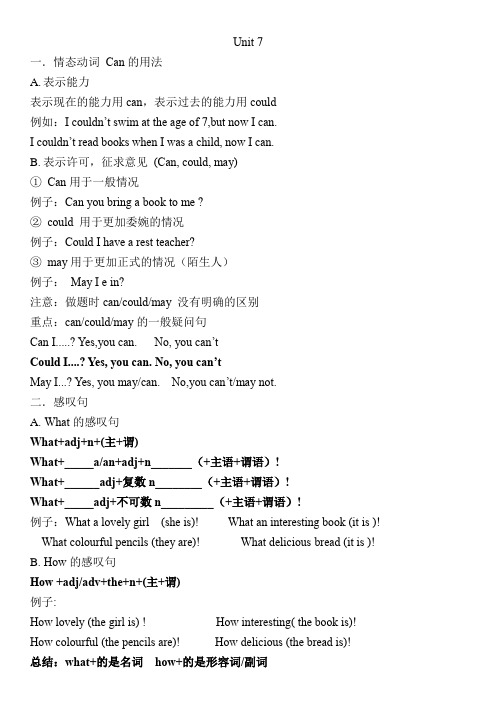
Unit 7一.情态动词Can的用法A.表示能力表示现在的能力用can,表示过去的能力用could例如:I couldn’t swim at the age of 7,but now I can.I couldn’t read books when I was a child, now I can.B.表示许可,征求意见(Can, could, may)①Can用于一般情况例子:Can you bring a book to me ?②could 用于更加委婉的情况例子:Could I have a rest teacher?③may用于更加正式的情况(陌生人)例子:May I e in?注意:做题时can/could/may 没有明确的区别重点:can/could/may的一般疑问句Can I.....? Yes,you can. No, you can’tCould I....? Yes, you can. No, you can’tMay I...? Yes, you may/can. No,you can’t/may not.二.感叹句A.What的感叹句What+adj+n+(主+谓)What+_____a/an+adj+n_______(+主语+谓语)!What+______adj+复数n________(+主语+谓语)!What+_____adj+不可数n_________(+主语+谓语)!例子:What a lovely girl (she is)! What an interesting book (it is )! What colourful pencils (they are)! What delicious bread (it is )!B.How的感叹句How +adj/adv+the+n+(主+谓)例子:How lovely (the girl is) ! How interesting( the book is)! How colourful (the pencils are)! How delicious (the bread is)!总结:what+的是名词how+的是形容词/副词练习:一、用can, can’t, could, couldn’t或may填空1. —________ you play basketball? —No, I ________ , but I ________ play football.2. —________ I use your new bike? —Of course you may.3. —________ Bill Gates use a puter when he was three years old? —No, he ________ .4. It will be warm tomorrow so we ________ wear dresses.5. —________ I borrow some money from you? —Sorry, you ________ . I don’t have any.6. Jack ________ pass this Maths exam, because he never works hard.7. Mrs Green bought a new car last month, so she ________ drive to work now.二、用what, what a, what an或how填空1. ________ fine day it was yesterday!2. ________ important work she is doing!3. ________ useful book it is!4. ________ interesting story our g teacher told us yesterday!5. ________ wonderful the music is!6. ________ great fun they had last night!7. ________ well the girl is playing the piano!8. ________ hard they are working in the field!2. ___________ fast he is swimming in the pool!A. How aB. What aC. WhatD. How3. Could you go to the bookshop with me?Sorry, I ___________. I have to finish my homework.A. can'tB. couldn’tC. needn'tD. mustn’t4. V olunteers (志愿者) from Lantian Team saved many travelers in the mountains.___________ they are!A. How great a manB. How great menC. What a great menD. What great men5. They ___________ go cycling yesterday, because the rain was too heavy.A. couldn'tB. can'tC. may notD. don’t6. You ___________ take me to the station. My brother is taking meA. can'tB. mustn’tC. shouldn'tD. don't have to7. When Jessica was young, she ___________ able to dance very well.A. can beB. might beC. could beD. was8. ___________ the children are having now!A. What a good timeB. What good timeC. How good timeD. How a good time9. Dad, ___________ I visit the Modern Art Museum next Monday?I'm afraid you can't. All the museums in this city are closed on Monday.A. wouldB. needC. shouldD. may。
牛津译林版预备课程lesson+7+parta课件
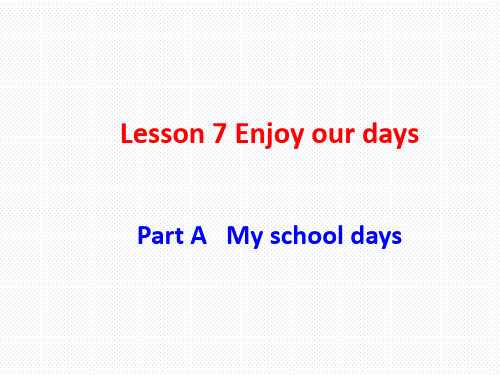
关于星期要注意 1.----What day is it today?
---It’s Wednesday today.
---It’s….
2. -Doyou have English lessons on Wednesday?
-Yes , we do.
Monday to Friday Saturday and Sunday have lessons (school da Saturday and Sunday (school days) have lessons (weekdend)
What time do your first classes begin? Our first classes begin at twenty. at eight twenty past eight
Lesson 7 Enjoy our days
Part A My school days
How many days are there in a week?
There are seven days. Do you know them?
Sunday Monday Tuesday Wednesday Thursday Friday Saturday
Monday to Friday Saturday and Sunday (school days) have lessons
(weekdends)
Do you go to school on Saturday or Sunday? No, we don’t.
We don’t go to school on Saturday or Sunday.
1.________ A writes this e-mail? A Nick B. Tommy B A. a school B. school days 2. This e-mail is about___. B to school every day. A. runs B. walks 3. Nick_____ 4. Nick loves______ A lessons on Friday. A. Computer B. Maths 5. Nick has PE lessons on Monday and__________ B A. Thursday B. Wednesday
Unit7知识点课件牛津译林版七年级英语上册
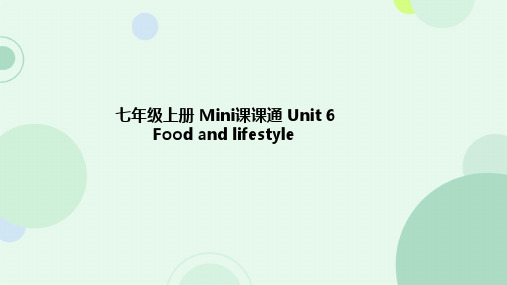
vi. “合适,合身” ex. This coat doesn't fit well.
go well with “与······很配” match sth. well ex. White can go well with all the other colours.
名词作定语,名词作定语原则上用单数,不用复数 ex. a meeting room 会议室(不能说meetings room)
a train station 火车站(不能说trains station)
有些只有复数形式的名词,则用复数作定语 ex. goods train 货车 clothes shop 服装店
have a try “试试看,尝试一下”
知识点:
8. Can we see another pair?
another “(三者或者以上中)另一个” ①+可数名词单数 ②+数词+可数名词复数 ex. This glass is broken. Get me another one.
another ten days
补
知识点:
hate vt. “讨厌,恨”,有强烈的感情色彩,反义词为like, love
补
知识点:
Here is my wallet. My wallet is here.
carry, bring, take
倒装句: ①Here/There +谓语+名词(主语). ②Here/There +代词(主语)+谓语.
有些习惯上通常用复数的名词,也习惯上用复数作定语
ex. sports car 跑车
译林版初中英语预备教程Lesson7 part A
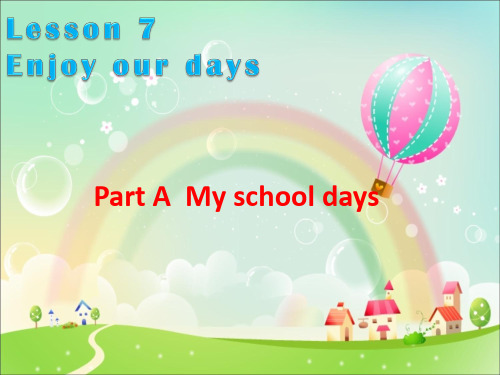
—— F
F doesn’t go
Task 3:Read and translate
Find out language points
Mon.
English Chinese, _______, Maths Science Art lessons _______________ Music Computer lessons _______________ PE _______________
SUN MON TUE WED THU FRI
SAT
29
Chinese
Maths
English
Science
Computer
PE
Music
Art
Course schedule MON 1 2 3 4 5 6 7 8 课程表 星期一 1 2 3 4 5 6 7 8 英语 生物 语文 数学 音乐 化学 星期二 历史 英语 语文 科学 体育 政治 数学 星期三 地理 语文 美术 数学 英语 物理 星期四 语文 数学 英语 电脑 化学 生物 历史 星期五 数学 英语 地理 语文 政治 体育 历史 English Biological Chinese Maths Music Chemical TUE History English Chinese Science WED Geographic Chinese Art Maths English Physics THU Chinese Maths English Computer Chemical Biological History FRI Maths English Geographic Chinese Political PE History
Tue.
Wed. Thur. Fri.
牛津译林版预备课程Lesson7 PartB 课件 (共24张PPT)
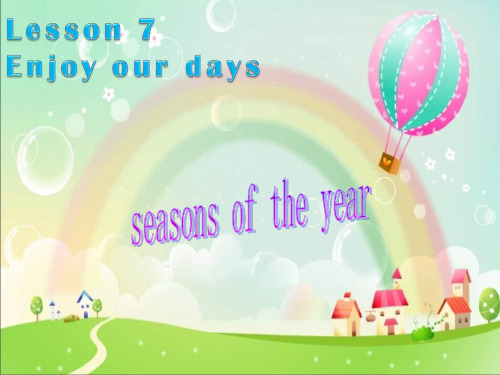
Listen to the tape and answer: How do people feel in spring/summer/autumn/winter?
In spring, it’s warm and windy .
In summer, it’s hot .
In autumn, it’s cool. In winter ,it’s cold.
Summer is hot.
We have a long holiday.
She doesn’t go to school in July or August .She likes swimming in this season.
She likes winter best .She likes playing in the snow.
9:30 in autumn. ( ) lie often goes to bed at 9:00 F
2.The Chinese New Year is in January or February. ( T )
3.It is warm and windy in spring. ( T) 4.Students have a short ) long holiday in summer. ( F
Read again, and find out some important phrases(重要的短语).
in the open air 1,在户外 2,好好睡一觉 have a good sleep 3,喜欢放风筝 like flying kites 4,放一个长假 have a long holiday in autumn 5,在秋天 at night 6,在夜里 sleep late 7,睡得晚 at 9:30 8,在九点半 in January 9,在一月 on Saturday 10,在周六
牛津译林版七年级英语上册Unit7语法知识点汇总
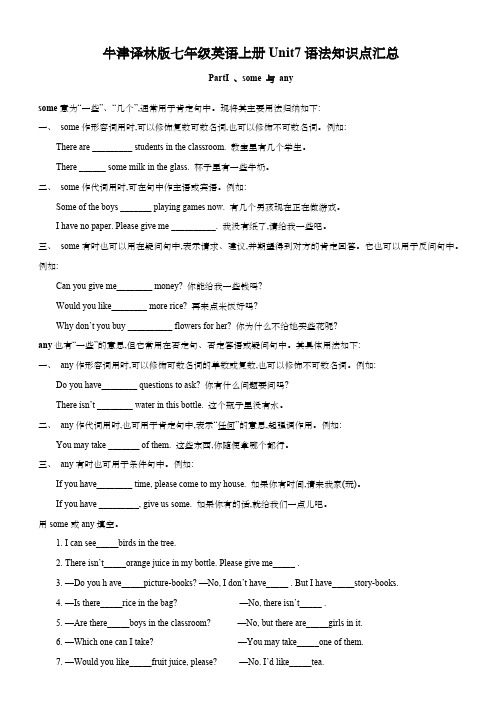
牛津译林版七年级英语上册Unit7语法知识点汇总PartI 、some 与anysome意为“一些”、“几个”,通常用于肯定句中。
现将其主要用法归纳如下:一、some作形容词用时,可以修饰复数可数名词,也可以修饰不可数名词。
例如: There are _________ students in the classroom. 教室里有几个学生。
There ______ some milk in the glass. 杯子里有一些牛奶。
二、some作代词用时,可在句中作主语或宾语。
例如: Some of the boys _______ playing games now. 有几个男孩现在正在做游戏。
I have no paper. Please give me __________. 我没有纸了,请给我一些吧。
三、some有时也可以用在疑问句中,表示请求、建议,并期望得到对方的肯定回答。
它也可以用于反问句中。
例如: Can you give me________ money? 你能给我一些钱吗? Would you like________ more rice? 再来点米饭好吗? Why don’t you buy __________ flowers for her? 你为什么不给她买些花呢?any也有“一些”的意思,但它常用在否定句、否定答语或疑问句中。
其具体用法如下:一、any作形容词用时,可以修饰可数名词的单数或复数,也可以修饰不可数名词。
例如: Do you have________ questions to ask? 你有什么问题要问吗? There isn’t ________ water in this bottle. 这个瓶子里没有水。
二、any作代词用时,也可用于肯定句中,表示“任何”的意思,起强调作用。
例如: You may take _______ of them. 这些东西,你随便拿哪个都行。
- 1、下载文档前请自行甄别文档内容的完整性,平台不提供额外的编辑、内容补充、找答案等附加服务。
- 2、"仅部分预览"的文档,不可在线预览部分如存在完整性等问题,可反馈申请退款(可完整预览的文档不适用该条件!)。
- 3、如文档侵犯您的权益,请联系客服反馈,我们会尽快为您处理(人工客服工作时间:9:00-18:30)。
牛津译林七年级预备教材Lesson 7 语法知识点
1. How are you? “你好吗?”常用来询问对方身体状况,表示关心别人,它的固定答句为:Fine, thank you.
(1)---How is he? ---______.
A. Simon
B. Fine
C. A worker
D. Good
(2)---How are your parents? ---They are fine, thank you.
2. Let me tell you about my school days. 让我告诉你我在学校的日子。
(1)let sb. do sth. “让某人做某事”,sb.代表“某人”;sth. 代表“某物、某事”;do代表动词原形。
Let叫做“使役动词”,即“使某人---;让某人---”。
Let me help you. Let us walk to school.
(2)tell sb.(某人) about sth.(某事)“告诉某人某事”。
如:Let me tell you about my family.
告诉他关于你们班级的情况。
Tell him about your class.
2. I get up early in the morning and walk to school.我早晨起床很早,然后步行去学校。
(1)get up “起床”,反意词:go to bed
快起床,到上学的时间了!Get up quickly! It’s time for school.
补充:get on; get off; get away; get in; get to ---
(2)walk to--- “步行去---(地方)”。
相当于:go to ---(地方) on foot.
我们每天步行上学。
We walk to school every day. (=We go to school on foot every day.)
让我们步行去公园。
Let us walk to the park.(= Let go to the park on foot.)
3. We have Chinese, Maths and English every day. 我们每天上语文、数学和英语。
have的一词多意用法。
(1)have “上课”。
我们每天上午上四节课。
We have four classes in the morning every day.
(2)have “有”。
我有一盒蜡笔。
I have a box of crayons.
(3)have “吃”。
我每天早餐一个鸡蛋和一杯牛奶。
I have an egg and a glass of milk for breakfast every day.
4. We do not go to school on Saturday or Sunday.我们周六和周日不上学。
注意此句中不能用“and”,因为该句是否定句。
5. Are they easy or difficult for you? 他们是容易的还是困难的?这是一个选择疑问句。
选择疑问句不能用“Yes”或“No”来回答,只能从提供的选项中选出一个来答。
如:---Do you like English or Chinese? ---I like English. (或I like Chinese.)
如:---Is Simon tall or short? ---He is tall. (或He is short.)
6. On Saturday or Sunday, people like flying kites in the open air. 在周六或周日,人们喜欢在户外放风筝。
(1)like doing sth. 一直“喜欢做某事”,已经形成一种习惯和爱好。
如:我爷爷喜欢看报。
My grandpa likes reading.
(2)fly kites “放风筝”,
我们每个星期日都放风筝。
We fly kites every Sunday.
(3)in the open air “在户外”
7. 介词in, on和at与时间副词的连用。
在(某年、某季节、某月)常用介词in。
in 2013, in autumn, in October ---
在(某月某日、某日、某日上、下午)用介词on。
on October 26,on Saturday, on Teachers’ Day, on Saturday evening ---
在某时某刻(几时几分)用介词at。
at 7:45, at six o’clock ---
注意:有些是固定短语,要记。
in the morning在上午;in the afternoon在下午;in the evening在晚上。
at night 在夜里;at noon 在正午
8. What time do you do sports?你什么时间进行锻炼?
do sports 体育“锻炼”。
我爷爷每天早晨都锻炼。
My grandpa does sports every morning.。
